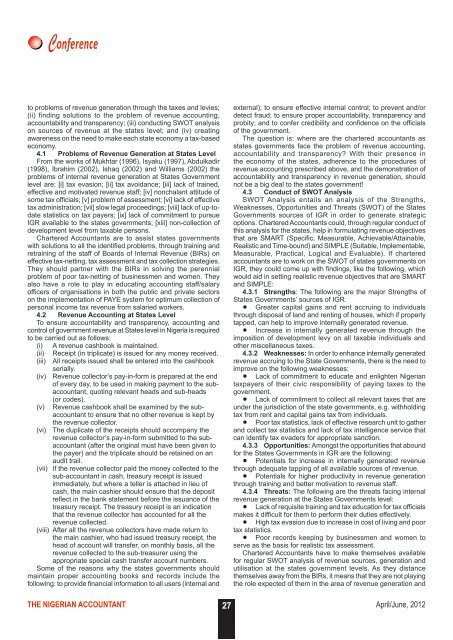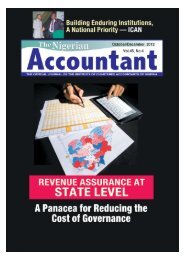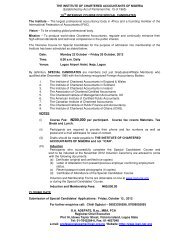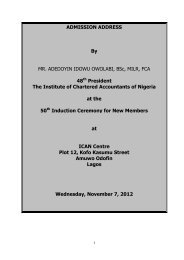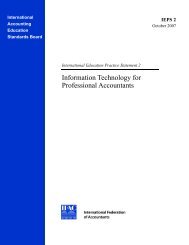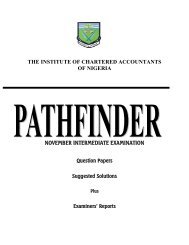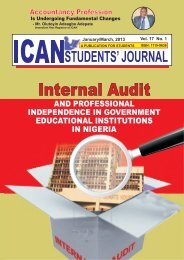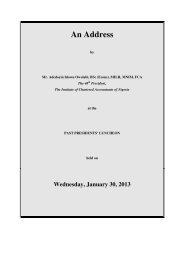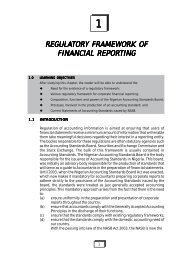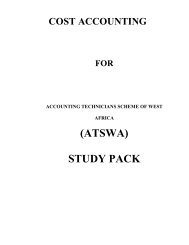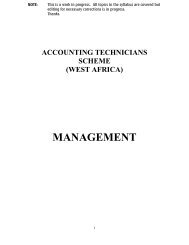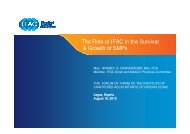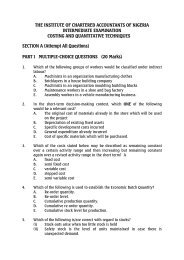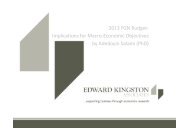The Nigerian Accountant 2012 - The Institute of Chartered ...
The Nigerian Accountant 2012 - The Institute of Chartered ...
The Nigerian Accountant 2012 - The Institute of Chartered ...
Create successful ePaper yourself
Turn your PDF publications into a flip-book with our unique Google optimized e-Paper software.
Conference<br />
to problems <strong>of</strong> revenue generation through the taxes and levies;<br />
(ii) finding solutions to the problem <strong>of</strong> revenue accounting,<br />
accountability and transparency; (iii) conducting SWOT analysis<br />
on sources <strong>of</strong> revenue at the states level; and (iv) creating<br />
awareness on the need to make each state economy a tax-based<br />
economy.<br />
4.1 Problems <strong>of</strong> Revenue Generation at States Level<br />
From the works <strong>of</strong> Mukhtar (1996), Isyaku (1997), Abdulkadir<br />
(1998), Ibrahim (2002), Ishaq (2002) and Williams (2002) the<br />
problems <strong>of</strong> internal revenue generation at States Government<br />
level are: [i] tax evasion; [ii] tax avoidance; [iii] lack <strong>of</strong> trained,<br />
effective and motivated revenue staff; [iv] nonchalant attitude <strong>of</strong><br />
some tax <strong>of</strong>ficials; [v] problem <strong>of</strong> assessment; [vi] lack <strong>of</strong> effective<br />
tax administration; [vii] slow legal proceedings; [viii] lack <strong>of</strong> up-todate<br />
statistics on tax payers; [ix] lack <strong>of</strong> commitment to pursue<br />
IGR available to the states governments; [xiii] non-collection <strong>of</strong><br />
development level from taxable persons.<br />
<strong>Chartered</strong> <strong>Accountant</strong>s are to assist states governments<br />
with solutions to all the identified problems, through training and<br />
retraining <strong>of</strong> the staff <strong>of</strong> Boards <strong>of</strong> Internal Revenue (BIRs) on<br />
effective tax-netting, tax assessment and tax collection strategies.<br />
<strong>The</strong>y should partner with the BIRs in solving the perennial<br />
problem <strong>of</strong> poor tax-netting <strong>of</strong> businessmen and women. <strong>The</strong>y<br />
also have a role to play in educating accounting staff/salary<br />
<strong>of</strong>ficers <strong>of</strong> organisations in both the public and private sectors<br />
on the implementation <strong>of</strong> PAYE system for optimum collection <strong>of</strong><br />
personal income tax revenue from salaried workers.<br />
4.2 Revenue Accounting at States Level<br />
To ensure accountability and transparency, accounting and<br />
control <strong>of</strong> government revenue at States level in Nigeria is required<br />
to be carried out as follows:<br />
(i) A revenue cashbook is maintained.<br />
(ii) Receipt (in triplicate) is issued for any money received.<br />
(iii) All receipts issued shall be entered into the cashbook<br />
serially.<br />
(iv) Revenue collector’s pay-in-form is prepared at the end<br />
<strong>of</strong> every day, to be used in making payment to the subaccountant,<br />
quoting relevant heads and sub-heads<br />
(or codes).<br />
(v)<br />
Revenue cashbook shall be examined by the subaccountant<br />
to ensure that no other revenue is kept by<br />
the revenue collector.<br />
(vi) <strong>The</strong> duplicate <strong>of</strong> the receipts should accompany the<br />
revenue collector’s pay-in-form submitted to the subaccountant<br />
(after the original must have been given to<br />
the payer) and the triplicate should be retained on an<br />
audit trail.<br />
(vii) If the revenue collector paid the money collected to the<br />
sub-accountant in cash, treasury receipt is issued<br />
immediately, but where a teller is attached in lieu <strong>of</strong><br />
cash, the main cashier should ensure that the deposit<br />
reflect in the bank statement before the issuance <strong>of</strong> the<br />
treasury receipt. <strong>The</strong> treasury receipt is an indication<br />
that the revenue collector has accounted for all the<br />
revenue collected.<br />
(viii) After all the revenue collectors have made return to<br />
the main cashier, who had issued treasury receipt, the<br />
head <strong>of</strong> account will transfer, on monthly basis, all the<br />
revenue collected to the sub-treasurer using the<br />
appropriate special cash transfer account numbers.<br />
Some <strong>of</strong> the reasons why the states governments should<br />
maintain proper accounting books and records include the<br />
following: to provide financial information to all users (internal and<br />
external); to ensure effective internal control; to prevent and/or<br />
detect fraud; to ensure proper accountability, transparency and<br />
probity; and to confer credibility and confidence on the <strong>of</strong>ficials<br />
<strong>of</strong> the government.<br />
<strong>The</strong> question is: where are the chartered accountants as<br />
states governments face the problem <strong>of</strong> revenue accounting,<br />
accountability and transparency? With their presence in<br />
the economy <strong>of</strong> the states, adherence to the procedures <strong>of</strong><br />
revenue accounting prescribed above, and the demonstration <strong>of</strong><br />
accountability and transparency in revenue generation, should<br />
not be a big deal to the states government!<br />
4.3 Conduct <strong>of</strong> SWOT Analysis<br />
SWOT Analysis entails an analysis <strong>of</strong> the Strengths,<br />
Weaknesses, Opportunities and Threats (SWOT) <strong>of</strong> the States<br />
Governments sources <strong>of</strong> IGR in order to generate strategic<br />
options. <strong>Chartered</strong> <strong>Accountant</strong>s could, through regular conduct <strong>of</strong><br />
this analysis for the states, help in formulating revenue objectives<br />
that are SMART (Specific, Measurable, Achievable/Attainable,<br />
Realistic and Time-bound) and SIMPLE (Suitable, Implementable,<br />
Measurable, Practical, Logical and Evaluable). If chartered<br />
accountants are to work on the SWOT <strong>of</strong> states governments on<br />
IGR, they could come up with findings, like the following, which<br />
would aid in setting realistic revenue objectives that are SMART<br />
and SIMPLE:<br />
4.3.1 Strengths: <strong>The</strong> following are the major Strengths <strong>of</strong><br />
States Governments’ sources <strong>of</strong> IGR.<br />
• Greater capital gains and rent accruing to individuals<br />
through disposal <strong>of</strong> land and renting <strong>of</strong> houses, which if properly<br />
tapped, can help to improve internally generated revenue.<br />
• Increase in internally generated revenue through the<br />
imposition <strong>of</strong> development levy on all taxable individuals and<br />
other miscellaneous taxes.<br />
4.3.2 Weaknesses: In order to enhance internally generated<br />
revenue accruing to the State Governments, there is the need to<br />
improve on the following weaknesses:<br />
• Lack <strong>of</strong> commitment to educate and enlighten <strong>Nigerian</strong><br />
taxpayers <strong>of</strong> their civic responsibility <strong>of</strong> paying taxes to the<br />
government.<br />
• Lack <strong>of</strong> commitment to collect all relevant taxes that are<br />
under the jurisdiction <strong>of</strong> the state governments, e.g. withholding<br />
tax from rent and capital gains tax from individuals.<br />
• Poor tax statistics, lack <strong>of</strong> effective research unit to gather<br />
and collect tax statistics and lack <strong>of</strong> tax intelligence service that<br />
can identify tax evaders for appropriate sanction.<br />
4.3.3 Opportunities: Amongst the opportunities that abound<br />
for the States Governments in IGR are the following:<br />
• Potentials for increase in internally generated revenue<br />
• Potentials for higher productivity in revenue generation<br />
through adequate tapping <strong>of</strong> all available sources <strong>of</strong> revenue.<br />
through training and better motivation to revenue staff.<br />
4.3.4 Threats: <strong>The</strong> following are the threats facing internal<br />
revenue generation at the States Governments level:<br />
• Lack <strong>of</strong> requisite training and tax education for tax <strong>of</strong>ficials<br />
• High tax evasion due to increase in cost <strong>of</strong> living and poor<br />
• Poor records keeping by businessmen and women to<br />
makes it difficult for them to perform their duties effectively.<br />
tax statistics.<br />
serve as the basis for realistic tax assessment.<br />
<strong>Chartered</strong> <strong>Accountant</strong>s have to make themselves available<br />
for regular SWOT analysis <strong>of</strong> revenue sources, generation and<br />
utilisation at the states government levels. As they distance<br />
themselves away from the BIRs, it means that they are not playing<br />
the role expected <strong>of</strong> them in the area <strong>of</strong> revenue generation and<br />
THE NIGERIAN ACCOUNTANT 27<br />
April/June, <strong>2012</strong>


